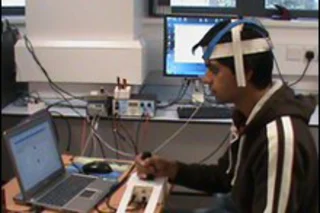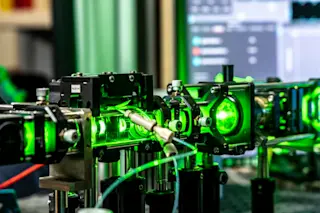It wasn't quite as dramatic as a slow-motion movie action sequence or a slo-mo instant reply, but researchers have successfully slowed down people's manipulation of a computer joystick by boosting one type of brain wave. The researchers
generated a small electrical current in the brains of 14 healthy volunteers using scalp electrodes. The current increased the activity of normal beta waves [New Scientist]
, and slowed the volunteers' reaction times by 10 percent. The study, published in Current Biology, has implications for Parkinson's Disease, in which patients have trouble with voluntary motions. Brain waves are generated naturally when groups of neurons fire in a certain rhythm. Lead researcher Peter Brown explains that the low-frequency beta waves were already known to play a role in movement.
"Different parts of the brain work together and generate certain frequencies," he explained, "and the movement areas of the brain come together in beta activity. ...














